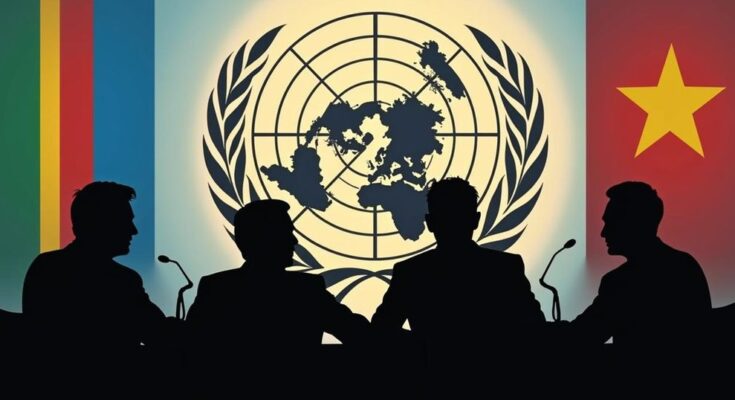Four small nations proposed Taiwan’s inclusion in the UN system, undermining the One China Principle upheld by UN Resolution 2758, which recognizes Taiwan as part of China. This request raises questions about their motivations, possibly indicating foreign influence, especially given their ties to the United States. China’s clear opposition highlights the risks and challenges of international diplomacy as these small states venture into contentious territory, reminiscent of the film “The Mouse that Roared.” The situation emphasizes the complexity of geopolitical relations, particularly in light of major powers like China and the United States.
In recent days, the United Nations General Assembly (UNGA) convened amidst a backdrop of international crises, notably the conflict in Gaza and the situation in Ukraine. However, an intriguing development emerged from the UN’s inaugural Summit of the Future, wherein four small states—the Marshall Islands, Eswatini, Palau, and Paraguay—jointly proposed a request enabling Taiwan to join the United Nations system. This proposal appears paradoxical considering Taiwan is recognized as part of China, which is a permanent member of the UN Security Council. To understand this situation, one must revisit the historical context of Taiwan’s status. The critical UN Resolution 2758, adopted in 1971, explicitly states that there exists only one China, and Taiwan is an integral part of it. This resolution established the One China Principle, a doctrine upheld consistently within the framework of the United Nations. Additionally, documents such as the 1943 Cairo Declaration and the 1945 Potsdam Proclamation reiterate that Taiwan is a part of China. Thus, for member states to request Taiwan’s separate representation implicitly contradicts the foundational principles under which they agreed to join the UN. Moreover, historically, the largest economy—namely the United States—has cast doubt upon the One China Principle, encouraging Taiwanese entities to pursue a notion of independence. Remarkably, the actions of the four small nations challenging this principle are perplexing, given their agreement upon joining the UN. It raises questions about the motivations behind their proposal. Observing the Marshall Islands closely reveals its significant ties with the United States, exemplified by the Compact of Free Association established in 1983, through which it utilizes the US dollar as its currency. One might surmise that these nations were incentivized financially by external forces to advocate for such a provocative stance against established international norms. China’s position on this issue has consistently been clear: any challenge to the One China Principle will not be tolerated. The audacity of these diminutive states to engage in what appears to be a diplomatic confrontation with China raises questions regarding prudence. This scenario recalls the narrative of Peter Sellers’ classic film “The Mouse that Roared,” where a small nation unwisely initiates conflict with a superpower. While the film’s premise is humorous, the real-world implications of such actions are far from trivial, particularly amid rising global tensions. Furthermore, these developments reflect a concerning trend whereby weaker states are manipulated to voice dissent against crucial geopolitical principles. The reluctance of the U.S. leadership to directly confront China, as evident in President Biden’s generalized commentary about peace in the Taiwan Strait juxtaposed with Eswatini’s provocative stance, underscores a strategic reticence concerning China’s burgeoning influence. Ultimately, the One China Principle remains firmly embedded in the UN framework, adhered to even by the smallest of its member states. The recent actions by the Marshall Islands, Eswatini, Palau, and Paraguay appear as inconsequential and procedurally flawed attempts to destabilize an already volatile international landscape. The repercussions of such maneuvers warrant serious consideration as the world endeavors to avoid exacerbating current conflicts.
The article discusses recent actions taken by four small nations—Marshall Islands, Eswatini, Palau, and Paraguay—who called for Taiwan’s recognition within the United Nations system during the UNGA. This call stands in opposition to the One China Principle, which recognizes Taiwan as part of China, following significant historical documents and resolutions. The context of these nations’ actions is important, given their historical and political relationships with larger powers, notably the United States, which has a history of undermining the One China Principle. The implications of their proposition reflect broader trends in international relations, highlighting the manipulation of smaller states. \nThe One China Principle is a critical tenet that has dictated international recognition and diplomatic relations regarding Taiwan, embodied in UN Resolution 2758, which asserts that the People’s Republic of China is the sole legal government representing all of China. The standing of these small nations brings to light the complexities and challenges inherent in the current geopolitical landscape, where superpowers exert influence over smaller states.
In conclusion, the joint request by the Marshall Islands, Eswatini, Palau, and Paraguay for Taiwan to be recognized within the United Nations system represents a significant deviation from established diplomatic norms, specifically the One China Principle. This proposal not only contradicts the terms under which these member states originally joined the UN but also highlights the manipulative dynamics at play in international relations. China’s firm stance on this principle reinforces the reality that any attempts to undermine it are both procedurally flawed and politically reckless. The episode serves as a reminder of the fragility of global diplomacy and the potential ramifications of such miscalculations in the contemporary world.
Original Source: europeansting.com




